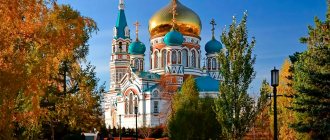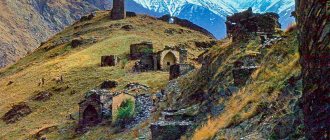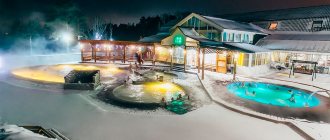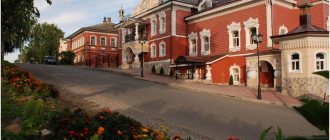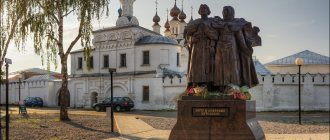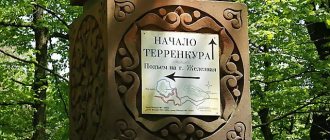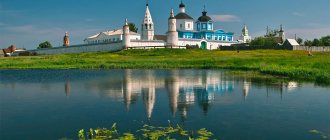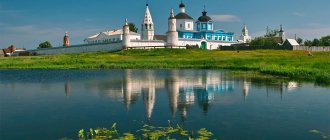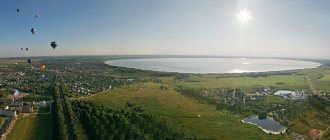The sights of Omsk reveal the rich history of a relatively young and dynamically developing city.
A border fortress, the capital of the Cossack army and even a place of exile - in such guises he appeared at different times, leaving buildings, sculptures and other memorials as souvenirs, a list of which is posted on https://www.syl.ru/article/158814/new_dostoprimechatelnosti -omska-foto-i-otzyivyi-turistov-reyting-dostoprimechatelnostey-omska. The main attractions can be divided into several groups.
Photo: syl.ru
Sights of Omsk in 1 day
Assumption Cathedral
Assumption Cathedral
On Cathedral Square they stop to admire the five-domed Holy Assumption Cathedral, built in accordance with the pseudo-Russian style towards the end of the 19th century.
This is not only the largest temple in Omsk - it is a famous historical place in Russia. The cathedral contains a shrine containing relics belonging to the canonized Archbishop and Holy Martyr Sylvester of Siberia.
The building of the Five-domed Holy Assumption Cathedral with ceramic icons on the external walls was built in accordance with the pseudo-Russian style towards the end of the 19th century. The cathedral houses a shrine - a shrine, in which lie the relics belonging to the canonized Archbishop New Martyr Sylvester of Siberia.
Also here are the icons: “The Kazan Mother of God”, signed personally by Patriarch Alexy II and “Holy Princess Anna Kashinskaya” with particles of her relics. Copies of miraculous icons: “Tikhvin Mother of God”, “Holy Great Martyr Barbara” and “Reverend Euphrosyne of Polotsk” with particles of the relics of the Saints who consecrated them.
It is interesting to look at the cave church, equipped as a museum. In the dark, the cathedral is illuminated by 100 lamps that work in accordance with the written light score.
Address : st. Tarskaya, 7, Omsk
Opening hours: services in the cathedral are daily, in addition, from 11 a.m. to 4 p.m., you can contact the clergyman on duty. At 3 o'clock every day there is time for prayer singing at the holy shrine.
Free admission
Official website: https://omsk-sobor.ru
Tara Gate
Tara Gate
Year of construction: 1792. Previously, this gate led to the ancient city of Tara. Later they became part of the Omsk fortress, through which the path lay to the convict prison. They are a 4-cornered monumental tower of a strict shape, with steps leading to the top.
Having climbed them, tourists find themselves in a former guard room, adapted into a museum. The building is an architectural symbol of the city, which is associated with a belief: in order for a wish to come true, you need to walk under the gate, jumping on one leg, after saying what you have planned.
Address: st. Spartakovskaya - continuation of Tarskaya Street, Omsk
Irtyshskaya embankment
Irtyshskaya embankment
A popular walking area is a 4 km long paved street, immersed in greenery, at the end of the road it ends at the Leningradsky Bridge over the Irtysh. Previously, the street was called Beregovaya. The embankment is attractive with old mansions and picturesque panoramas; newlyweds and guests of Omsk are sure to take pictures against their background.
Walks along the Irkutsk Embankment introduce you to cultural and educational sites and lead to sports and play areas.
Address: st. Irtyshskaya embankment
Complex "Omsk Fortress"
Complex "Omsk Fortress"
The Siberian fortress fortification was erected in 1717 to protect the southern approaches from nomadic enemies. The buildings of the first fortress (2 redoubts), unfortunately not preserved, give rise to the city of Omsk.
The second fortress (built in 1768) has been partially preserved, and this is due to the fact that a military unit was located here. Now, with the onset of warm days, the fortress territory is occupied by city museums, exhibitions and craft fairs.
Address: Partizanskaya street, 5, Omsk
Opening hours: Monday to Thursday from 9 am to 6 pm, Friday until 5 pm, lunch break from 1 pm to 2 pm. On weekends by appointment.
Entrance: visit to the exhibition 150 rubles, master class 90-350. An adult excursion ticket costs from 100 to 150 rubles, a child’s from 50 to 100 rubles.
Sculpture "Lyuba"
Sculpture "Lyuba"
A popular attraction in Omsk is the statue of “Omsk Lyubochka” by sculptor Noryshev, which appeared here in 1999. They say that a girl from a rich but impoverished Lvov family fell in love with a young, but also poor lieutenant.
The lovers were not destined to be together - the successful governor of Omsk, Gustav von Hasford, became Lyuba's husband. Having left with her husband for a new distant city, the girl yearned for her beloved.
Lyubochka's broken heart could not accept the separation and, having fallen ill with consumption, the young wife, having lived here for 1 year, died.
Address: intersection of Lenin and Karl Liebknecht streets, Omsk
Monument to Don Quixote
Monument to Don Quixote
In 2000, in front of the building of the theater for young spectators and next to Pushkinka, the original identical sculptures of Don Quixote on horseback were installed. The project was developed by Vakhitov, and welded from metal parts by Omsk sculptor Kapralov.
The ironic manner of the Knight of the Sad Image with incredibly positive energy has become the most popular city sculpture among tourists for photo shoots.
Address: Central District, Karl Marx Ave., 4B (in front of the Youth Theater) and on the street. Red Path, Omsk
Monument to Lovers
Monument to Lovers
The year the sculpture was installed is 2014, and in the place where Omsk residents like to walk. The monument depicts a guy and a girl sitting at a table. The lovers, without looking away, look at each other while talking with a cup of tea. The bronze figures are life-size and sit on cast iron benches at a cast iron table.
The sculpture was made by father and son Mishanin, Ilya and Pavel, commissioned by an Omsk businessman. It was at this place that the young man met a girl whom he soon married.
Address: Irtyshskaya embankment, square named after. Vrubel, Omsk
Jubilee Bridge
Jubilee Bridge
You get to the city center via the Jubilee Bridge (built in 1967), 80 m long. From the bridge you can photograph the historical buildings of the central part; on holidays it is a pedestrian zone. Local residents often tell a mysterious legend about the caves over which the bridge is built.
Before this, 2 bridges were built here, as can be seen from the remaining fragments. Wooden piles remain from the first construction in 1826. It was replaced in 1903 by the design of the Paris iron drawbridge.
Address: st. Lenina, Omsk
History of the first constructions
The year of foundation of Omsk is considered to be 1714. Of course, before the construction of the main objects, namely the Omsk fortress, began, people already lived on the territory of the city, as on any land near large rivers rich in fish, such as the Irtysh and Om. It is near these watery geographical features that archaeologists to this day find traces of the presence of ancient settlers of the 6th millennium BC. e. to XIII century AD e.
However, Peter I began serious development of the Siberian land to strengthen Russian borders in the east, as well as scientific research and the search for “sand gold”.
Colonel Ivan Buchgolts received the tsar's order to build a fortress on the Om River, leave a garrison there and move on with the expedition. So in 1716 the first fortress was founded in the city of Omsk. The fortress had four gates: Omsk, Tara, Tobolsk and Irtysh. The Tobolsk Gate has survived to this day, and in 1991 the Tara Gate was restored.
Afterwards the so-called headquarters was built, which has survived to this day. The city gradually grew, and in 1764 the Resurrection Cathedral was erected; it became the first stone building of the city; it would be demolished only in the 20th century. The first architecture of Omsk was being formed. New buildings, general and commandant's houses, barracks, a market and an educational institution were gradually built around the fortress.
Sights in the vicinity of Omsk
Achair Monastery
Achair Monastery
In 1890, a women's community appeared here, which later became a monastery, which existed for 30 years. In 1930-1953 The Gulag colony was organized. The convent was restored in 1993.
The main shrine of the monastery is called the Achair Icon of the Mother of God, which was painted at the beginning of the 21st century. icon painter Gennady Adaev.
The monastery is located on 38 hectares along the bank of the Irtysh. Visitors explore the temples (there are 7 of them), chapels and a 57-meter bell tower with 7 bells. They get acquainted with the monastic cells and visit the refectory hall. There is a hotel for those wishing to stay overnight. At the end of the last century, a healing spring with warm mineral water was discovered on the monastery land.
Address: pos. Embankment, 50 km from Omsk, on the street. Monastyrskoy, 12/4; GPS: 54.66569, 73.81763
Opening hours: from 6 a.m. to 8 p.m. every day. Organization of excursions from 11 a.m. to 5 p.m.
Admission: for Russians in a group of 10 people – 100 rubles each. per adult, 50 per child and student
Official website: https://www.achair.ru
Park of Culture and Recreation "Green Island"
Park of Culture and Recreation "Green Island"
The cultural zone was created here in order to carry out sports and recreational work among the townspeople. In addition, the park played a big role in organizing active family recreation. The grand opening of the green zone with various sports and cultural facilities took place in the summer of 1881.
People come to the park to admire the beauty of nature, ride bicycles or jog, and breathe clean air. Like other parks, there are rides and fun on the playgrounds.
Address: Vodnikov town in the Soviet district, Starozagorodnaya Roshcha, 10/1; GPS: 55.00363, 73.33884
Opening hours: from 10 to 22 hours daily
City architecture
Omsk is located on the Irtysh and Om rivers. Like all cities of that time, it was made of wood. Since 1826, there has been a series of fires that almost completely destroyed the city. From that time on, a new architectural life in Omsk began. The architect V. Geste was sent here from St. Petersburg to create a new and modern city. At that time, a palace was built for the governor, gardens, a commercial school, a Siberian cadet corps and the first street lighting appeared.
The houses along the river belonged mainly to wealthy citizens and were built of stone, while the rest of the buildings remained wooden. After the arrival of the railway in 1894, the city began to develop rapidly.
Subsequently, the city was built like an amphitheater: low buildings in the center, and the further from it, the height of the buildings increased. Behind the historical part of the city, 20-30-story buildings have risen. Now the Department of Architecture and Urban Planning of Omsk is solving problems with the restoration of a number of historical monuments that are in a decadent state. Many wooden monuments were destroyed in the 90s with the development of private business. Now the architecture of old Omsk requires very serious reconstruction, and it is often easier to completely destroy it than to preserve it.
Where to go in Omsk and what else to see
Museum of History and Local Lore
Museum of History and Local Lore
The largest Siberian museum of local history was created in 1877 from exhibits and collections of scientific expeditions and trips to Asia. The museum regularly updates exhibitions and has permanent exhibitions displaying more than 200 thousand exhibits. All of them are of artistic, historical and cultural value.
The museum is also famous for rare cast-iron figures of winged lions from China, a 3-meter skeleton of a woolly mammoth and a French car produced at the beginning of the 20th century. All this will be interesting to watch for both adults and children.
Address: st. Lenina, 23 A, Omsk
Opening hours: Tuesday to Sunday from 10 am to 6 pm, closed on the first day of the week
Entrance : adult ticket 30-200 rubles, student ticket - 25-150, for schoolchildren and pensioners - 210-130, for children from 5 to 7 years old - 10-40 rubles.
St. Catherine Lutheran Church
St. Catherine Lutheran Church
The building is in the Siberian Baroque style, which appeared at the end of the 18th century. It is considered the only surviving religious building of that time, but it served as a temple until 1930.
Now the renovated building houses exhibits of the regional ATC Museum. Here you should pay attention to award and memorial signs, see real ancient and modern weapons, and learn the history of the Omsk police.
Inside, the temple decoration has not been preserved, but on the outside the building still has pilasters and arched windows with curved cornices.
Address: st. Dostoevsky, 2, Omsk
Opening hours: Monday to Thursday - 9 am to 6 pm, Friday - until 16 pm, Saturday and Sunday - days off
Entry: free
Museum of Military Glory
Museum of Military Glory
The 2-story red brick building was built in 1918. It then housed the military district committee and district headquarters. In 1985, the building was given over to museum exhibits telling about the exploits of the inhabitants of Omsk during the Great Patriotic War.
The exhibition consists of photographs, postcards, letters. Visitors will be interested to get acquainted with cameras and radio equipment of those times, with Soviet military uniforms and awards. Fascist trophy items are also displayed here. There is an outdoor exhibition of military equipment.
Address: st. Taube, 7, Omsk
Opening hours: Tuesday – Sunday from 10 am to 6 pm.
Entrance: adult ticket - 70-100 rubles, school ticket - 50-60 rubles, student and pension ticket - 40-70 rubles, preschool ticket - 10 rubles.
Museum of Kondraty Belov
Museum of Kondraty Belov
An ancient wooden house, similar to a fairy-tale tower, was built by entrepreneur F. F. Stumpf. Now in this cozy building with lace trim, a small mezzanine and turrets, museum exhibits are located.
Kondraty Belov, a national Siberian landscape artist who lived in Omsk most of his life, chose the house on his own to protect it from demolition. After the tour, museum visitors are invited to the living room to taste pies and tea from the samovar.
Address: st. Valikhanova, 10, Omsk
Opening hours : Tuesday-Sunday, from 10 am to 6 pm
Entrance: adult ticket 65 rubles, children’s ticket – 50; pension - 30, student - full-time students do not need to pay, an additional payment of 10 rubles for tea and pies.
St. Nicholas Cossack Cathedral
St. Nicholas Cossack Cathedral
This is the oldest temple in the city. Sketches of the cathedral were provided by the St. Petersburg architect Vasily Stasov, and money for construction was donated by Siberian Cossacks. The temple has 3 altars and a base - an elongated rectangle, 3 Empire style entrances - a portico.
The cathedral, founded in 1883, housed the main shrine of the temple - a banner belonging to Ataman Ermak, on which Saint Dmitry of Thessaloniki is depicted. Now, instead of the lost shrine, you can see its copy here. The relics of 13 saints are also kept here.
Address: Omsk, st. Lenina, 27
Opening hours: daily, from 8 am to 7 pm until the end of the evening service
The entrance is free
Official website: https://nikolo-kazachi-sobor.ru
Bird Harbor Nature Park
Bird Harbor Nature Park
This is a specially protected natural park, of which there are only 2 in the world: in New York and here in Omsk, on an area of 150 hectares. Bird Haven preserves wildlife despite being the center of a large industrial city.
Bird migration routes pass through the reserve, so in spring and autumn the reservoirs of the “Gavan” are occupied by resting birds, which sometimes gather up to 3 thousand individuals. Along the eco-tourist trail there are stands with materials that are allowed to be touched. The park has an observation deck 12 m high and a museum.
Address: st. Yeniseiskaya, 1, building 2, Omsk
Working hours: from 9 am to 10 pm seven days a week, from 13 to 14 lunch break
The entrance is free
Pushkin Library
Pushkin Library
The building of the largest library in Russia was built from 1986 to 1995. designed by Omsk architects Zakharov and Naritsina. On the side façade of the building there are reliefs on historical themes.
The niches on the main facade are filled with eight sculptures of famous people associated with science and history of the USSR and Russia. The institution stores 3.5 million copies of printed materials for reading. The library regularly organizes regular exhibitions on all sorts of topics.
Address: st. Krasny Put, 11, Omsk
Opening hours : Monday to Thursday and Saturday from 10 am to 8 pm. On Sunday - until 18. From July to August - daily, except Sunday, from 10 am to 6 pm
Park of the 30th anniversary of the Komsomol
Park of the 30th anniversary of the Komsomol
It occupies more than 70 hectares of green space in Omsk, which began to be improved in 1940. The park is designed for a comfortable and carefree holiday with walks along cozy alleys or use of rental points where sports and water equipment are offered.
Vacationers are offered various attractions, fun in the children's town and pedicabs. Those who wish can ride horses or interact with animals in the petting zoo, feed tame squirrels or go to an ostrich farm.
Address: Maslennikova street, 136, Omsk
Opening hours: from 9 am to 10 pm. Attractions, in the warm season, are open seven days a week. They open at 11:00 pm and close at 9:00 pm.
Entrance: free, rides - 120 rubles. and higher
Concert Hall of the Omsk Philharmonic
Concert Hall of the Omsk Philharmonic
The hall was built in 1967, and in 2011 the building underwent a large-scale reconstruction. As a result, original black glazing appeared on the façade. The stage area of the hall was made in accordance with international standards.
Now it has unique acoustic properties to host world-class concerts. The ceiling was made 10 m higher.
On the sides of the stage, inclined structures were installed, in which special niches were installed to dissipate sound. These niches make the hall trapezoidal to create a strong and clear sound. An ideal place for lovers of great music.
Address: st. Lenina, 27a, Omsk
Opening hours of the central ticket offices : from 10 a.m. to 7 p.m. From 2 p.m. to 2:30 p.m. – lunch break
Sovetsky Park
Sovetsky Park
The park's territory of 36 hectares was replenished with 100 new seedlings. 5 hectares of the park are occupied by attractions. Paths with a special smooth asphalt surface are especially popular with cyclists.
There is also a beach nearby, where sunbathing lovers can descend along a well-maintained staircase. The main thing that this park is famous for is its massive holiday celebrations.
Here they say goodbye to the winter and organize events for Children's Day and Youth Day. The park also celebrates New Year's holidays and organizes various competitions.
Address: Andrianova street, 3, Omsk
Opening hours : seven days a week, the park opens at 11 a.m. and is open until 9 p.m.
Entrance: free, tickets for attractions 80-100 rubles.
Circus
Circus
The Omsk circus troupe has existed for 100 years and is famous for its gymnasts and acrobats, strongmen and magicians. Wild and domestic animals perform in the arena. A new original building with a hall for 1.5 thousand spectators was built in 1973.
In 2016, a large-scale renovation was carried out here, and soon a new reconstruction is planned with the restoration of the facade, fountains and the construction of a safari park. Going to the circus is a great opportunity to spend time with your family and watch interesting performances.
Address: ave. Karla Marksa, 43B, Omsk
Ticket office opening hours: from 10 to 19 hours, the circus is open until 18 hours.
Admission: up to 3 years of age, a ticket is not required, if the child does not sit in a separate seat, a ticket is purchased only when the child turns 3 years old.
Water park "AquaRio"
Water park "AquaRio"
In a Siberian city, especially in winter, visiting an oasis where even in the cold season the air is heated to 30 degrees means leaving a sea of joyful memories.
Kids, as everyone knows, are delighted with children's water attractions. And adults are not averse to going to spa complexes with a jacuzzi and a sauna, while the child can be left in the play area, where animators will look after him.
There are many types of bathhouses on the territory of the water park. Visitors enjoy sliding down the slides, choosing from 6 names, and swimming in the pools, including the wave pool.
Address: Zavertyaeva street, 5, Omsk
Opening hours: autumn - winter from 12 to 21 o'clock on Monday, Tuesday, Wednesday and Thursday, Friday - until 22 o'clock, on weekends and holidays - from 10 to 22 o'clock, that is, the same as in summer
Admission: on weekdays for the whole day - adults - 1200 rubles, children - 700, on weekends - 1400 and 840 rubles. respectively
Zoo
Zoo
Refers to the Children's Ecocenter (Yunogorodok), which began with a small ornithological corner 30 years ago. With the move to a new house, the number of animals and birds constantly increased. For heat-loving inhabitants, a warm building was built in 1994. A pond was equipped for waterfowl.
Now the zoo occupies an area of 3.5 hectares and has 1.5 thousand birds and animals. Here visitors get acquainted with the inhabitants of the terrarium, aquarium, and decorative mammals.
When children come to the zoo, they interact with animals, attend master classes, and on weekends they take part in quests and receive prizes.
Address: Marshal Zhukov street, 109, Omsk
Opening hours: from Tuesday to Sunday - from 10.30 to 19.00, on Monday there is a sanitary day at the zoo; summer enclosures are closed in October and open only in May
Entrance: an adult ticket costs 100 rubles, a child from 5 years old - 50 rubles, up to 5 years old admission is free, but only with an adult
Drama theatre
Drama theatre
The first and largest Siberian professional theater was founded back in 1874. In the same year, a wooden building was built for the troupe, which later burned down. But in 1905, according to the design of the architect Khvorin, it was replaced with a stone structure.
Now the Omsk Drama Academic Theater is housed in a luxurious ancient building in the eclectic style, combining elements of Baroque and Classicism. In 1915, a large-scale reconstruction was carried out here, and a sculpture of the “Winged Genius” by the Czech sculptor Winkler was installed on the pediment.
The theater is famous for its real theater hall, which is equipped with a stalls, an amphitheater, boxes and a balcony. The diverse repertoire includes award-winning original productions and performances by touring artists.
Address: st. Lenina, 8A, Omsk
Cash desk opening hours: from 10 to 19 hours 30 minutes. Performances start at 19:00.
Musical Theatre
Musical Theatre
The theater moved to a modern building with a large light and music fountain on the square in 1981. The building is distinguished by its high rear part, which is called the “springboard”. Inside is the largest stage in the city and region, and the hall is designed for 970 spectators.
The troupe's repertoire includes classical and modern operas, operettas, ballets, musicals and other musical works. The theater museum houses exhibitions about the performances, artists and the main historical milestones of the troupe.
Address: st. 10 Let Oktyabrya, 2, Omsk
Cash desk opening hours: seven days a week from 10 a.m. to 7 p.m., with three technical breaks per day
Entrance: children's ticket for a daytime event - 200-300 rubles, adult for an evening performance - 200-1200
Literary Museum named after. F. M. Dostoevsky
Literary Museum named after. F. M. Dostoevsky
The one-story house in which the serf commandants lived was built in 1799. In 1850, the Russian Major General de Grave, the last commandant of the fortress, provided assistance to Dostoevsky, who was serving 4 years of hard labor here.
Since 1983, a museum with nine exhibition halls has opened in the building. The main exhibits tell how the famous writer lived and worked. Other rooms contain material about writers associated with Omsk. In a separate room, the life of convicts is clearly shown.
Address: st. Dostoevsky, 1
Opening hours: Tuesday to Sunday from 10 am to 6 pm
Admission: for adults – 100-120 rubles, students – 60, schoolchildren – 50, children from 5 to 7 years old – 35 rubles. Foreign citizens pay 300 rubles.
Batyushkov's mansion
Batyushkov's mansion
A colorful mansion - an example of urban architecture of the early 1900s, which previously belonged to the local merchant Batyushkov, now occupies the House of Celebrations. An elegant building with an area of more than 500 square meters. m, built of stone in an eclectic style, with ideal ventilation and steam heating, made for the first time in the city.
During the Civil War, the building was occupied by Kolchak's headquarters. Now one part of the house is given over to the city registry office with a wedding salon.
The other part is dedicated to the first Civil War Museum in Russia with interesting historical and archival exhibitions. In one room, Kolchak’s study is decorated with a wax figure of the ruler.
Address: st. Irtyshskaya embankment, 9, Omsk
Museum opening hours : Monday to Thursday - from 8.30 to 17.15. On Saturday – until 16:00. Break daily from 13:00 to 14:00.
Entry: free
Museum named after M.A. Vrubel
Museum named after M.A. Vrubel
The regional art gallery is located on the 2nd floor in the former Trade building of Omsk. The works of Vrubel, who was born in Omsk, are on display here. Also stored are masterpieces belonging to other famous Russian and foreign artists: Surikov, Aivazovsky, Levitan, Repin, Picasso, Rembrandt.
Visitors are attracted to the works made by micro miniaturist Anatoly Konenko. Rare books and archaeological collections occupy a special place.
Address: st. Lenina, 3, Omsk
Opening hours: from 10 am to 7 pm. Monday is a day off.
Entrance : for permanent exhibitions - 300 rubles. for adults, 70 for schoolchildren, 160 for pensioners and 40 for preschoolers from 5 years old
Holy Cross Cathedral
Holy Cross Cathedral
Since 1980, the building has been considered a historical and cultural monument. A snow-white temple was built at the request of the governor of Omsk, Gasford, for suburban residents using donations that had been collected for more than 5 years. The project was developed in 1862-63. architects Wagner and Ezet. In 1870, the single-altar church was consecrated. After 26 years, the 2nd altar was consecrated, then the 3rd.
The length of the cathedral is 37 m, width - 22. The dome, altar, chapels and bell tower are crowned with gilded domes with eight-pointed crosses, also covered with gold. The bell tower is famous for its 1180 kg bell.
Visitors look with interest at the elegant lacquered paintings on the walls, made as in the Kiev Cathedral, and other decorative elements.
Address: st. Tarskaya, 33, Omsk
Opening hours: from 8 am to 7 pm
Free admission
Official website : https://vozdvizhenie.prihod.ru/
Seraphim-Alekseevskaya Chapel
Seraphim-Alekseevskaya Chapel
A stone building, with a tent-shaped upper part, appeared near the Yubileiny, then Iron Bridge in 1907. The reason for the construction was that the long-awaited heir to the throne, Tsarevich Alexei, was born into the tsar’s family.
The chapel was named after the Wonderworker Seraphim of Sarov. The neat 2-story building was designed by the Siberian architect Kryachkov in the style of Yaroslavl architecture. The chapel, which was later destroyed, was restored in 1994 according to Desyatov’s design.
Tourists are attracted by the solemn appearance of the building with a snow-white finish and an original multi-level roof. At the top there is a sharp peak with a gilded onion - a dome and a gilded cross. Inside there are a number of memorial plaques on which the names of the victims of the Russo-Japanese War are carved.
Address: st. Partizanskaya, 1, Omsk
Opening hours: daily from 10 a.m. to 6 p.m.
Entry: free
"Arena Omsk"
"Arena Omsk"
The city is considered the hockey capital of Siberia with the famous Avangard team. In 2007, at the end of August, the main city ice arena opened for hockey fans - the most spacious stadium in the country.
The stands were designed for 10 thousand spectators, and the 4-story building occupied 25 thousand square meters. m area. But after 12 years of existence, the palace, which cost $150 million to build, was demolished. The construction of the new arena is expected to be completed soon.
Address: st. Lukashevicha, 35, Omsk
Omsk Drama Theater
It is worth noting that there are currently 14 operating theaters in Omsk. The most respected of them is the Drama Theater, which is also the largest in the north.
The wooden building, the predecessor of the theater, burned down, and a new stone building in the Baroque style was built in 1920. The theater is decorated with many sculptures, the main one of which greets visitors on the roof, called “Winged Genius”.
FAQ
Where can you go with children in Omsk? Buchholz Square, Monument to mechanic Stepanych, Irtysh embankment, Complex "Omsk Fortress", Sculpture "Lyuba", Monument to Don Quixote, Natural Park "Bird Harbor", Park of the 30th anniversary of the Komsomol, Park "Sovetsky", Circus, Water park "AquaRio", Zoo.
What sights in Omsk should a tourist see first? Assumption Cathedral, Tara Gate, Irtysh Embankment, Omsk Fortress Complex, Sculpture “Lyuba”, Monument to Don Quixote, Monument to Lovers, Jubilee Bridge.
What sights of Omsk can you see on your own? Pedestrian street Chokan Valikhanov, Museum of History and Local Lore, Lutheran Church of St. Catherine, Museum of Military Glory, St. Nicholas Cossack Cathedral, Museum named after M.A. Vrubel.
What interesting monuments are there in Omsk? Monument to mechanic Stepanych, Sculpture “Lyuba”, Monument to Don Quixote, Monument to lovers.
Bridges
It is impossible to imagine a city on a river without bridges. There are ten of them in Omsk! The first bridges in Omsk began to be built in the 1790s. The city is a major transport hub; the first railway bridge was built here in 1896, and in 1919 it was blown up during Kolchak’s retreat. A year later it was completely restored.
The symbol of the city is the Jubilee Bridge, which was reconstructed more than once and finally “found itself” in 1926.
The bridges fit harmoniously into the architecture of Omsk.
Best hotels in Omsk
Related materials:
- 29 best attractions in Orel, recommended for…
- 35 best attractions in Irkutsk that are worth...
- 37 must-see attractions in Dubai
- 34 best attractions of Novosibirsk,…
- 35 sights of Kolomna that are worth seeing
- 27 best attractions of Bryansk, recommended for…
- 34 attractions of Alushta recommended for visiting
- 23 best Teriberka attractions that are worth...
- 36 Izmir attractions recommended for…
Did you like the article? Share with friends:
1
Modern city
Perhaps the most unusual building in the city is the Musical Theater. Built in 1981, the musical comedy theater was supposed to resemble a harp, a piano and a floating ship at the same time. However, the majority of townspeople and guests of the city see the architectural design as more of a springboard for skiers than musical instruments.
The red roof of the theater catches the eye from all aerial angles of the city, which attracts everyone's attention.
Sports arena
Speaking about culture, it is worth remembering sports. This important component of the life of residents of the city of Omsk is reflected in the ultra-modern Arena-Omsk building. This multifunctional sports complex was built in 2007 and accommodates more than 10 thousand people.
The building is notable for its entirely glass front facade; the structure has the shape of a parallelepiped. This sports “house” has hosted more than one large-scale sporting event.
Omsk is very rich in architectural monuments, museums, statues, unusual buildings, fountains and parks. It is impossible to describe them all in one article. But you can be sure of one thing: when you come to this young millionaire, you will have something to do! Here everyone can find an interest for themselves, be it sports or history, a museum or contemporary art.
The city has collected all possible styles of architecture: modern, classicism, baroque. The architecture of old wooden Omsk differs sharply from modern buildings. Over time, the new displaces the past, and city buildings from different centuries become confused. But the city administration is trying to preserve history in monuments and not “eclipse” historical objects with modern glass and high-rise buildings. The architectural monuments of Omsk are amazing and diverse; Omsk residents are deservedly proud of their city and its history.
